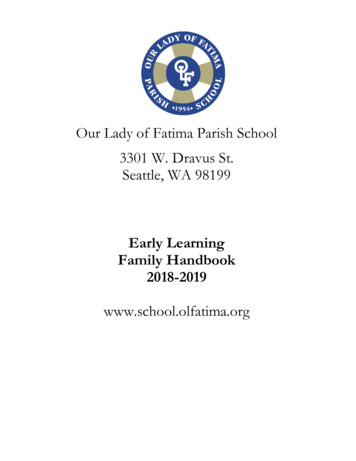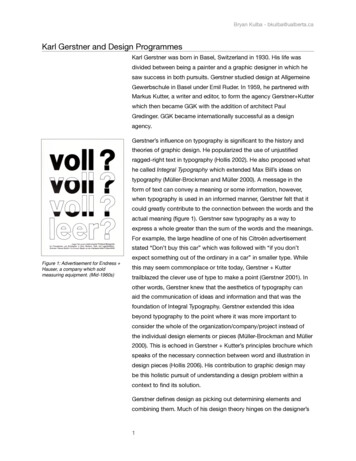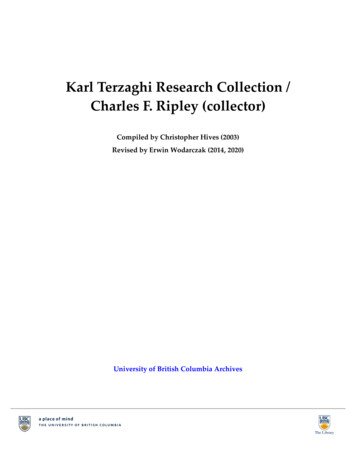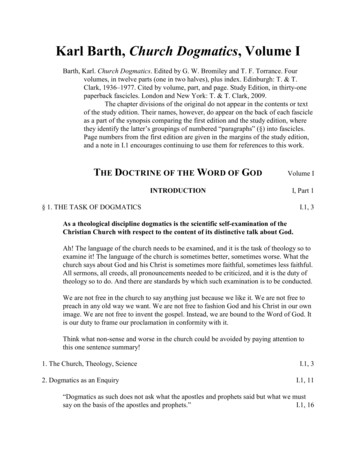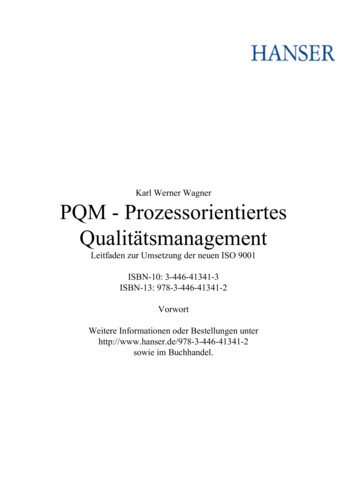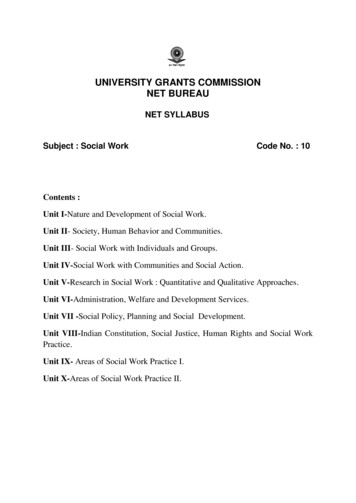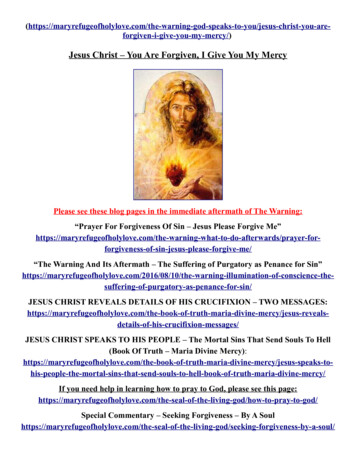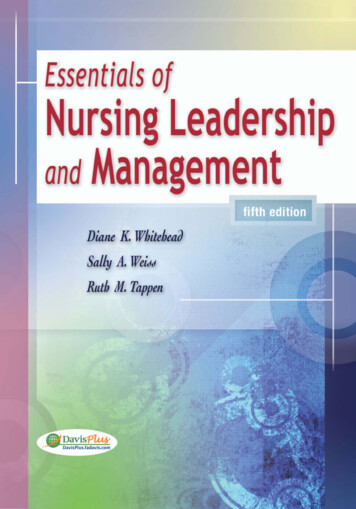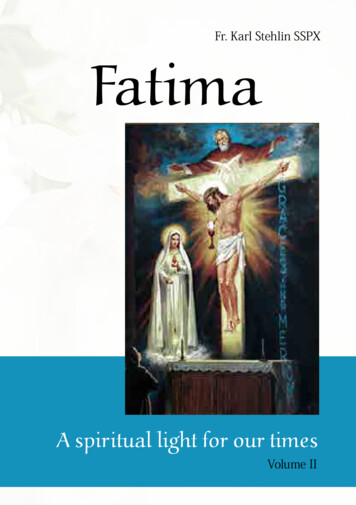
Transcription
Fr. Karl Stehlin SSPXFatimaA spiritual light for our timesVolume II
FatimaA spiritual light for our times
Fr. Karl StehlinFatimaA spiritual light for our timesVolume IIMIKolbe Publications2017
English edition copyright 2017 byKolbe PublicationsCopies Available:Kolbe Publications286 Upper Thomson Road Singapore 574402www.kolbepublications.comemail: sales@kolbepublications.comISBN 978-981-11-2625-3Printed IIAll rights reserved
PrefaceFatima is the overwhelming revelation of the greatness of God’sinfinite love and mercy towards us poor sinners, illuminated in themystery of the Immaculate Heart of Mary, His masterpiece. HerHEART reveals and gives to us all that God wants to give to theworld, every grace of conversion and sanctification, all virtues, gifts,and inspirations of the Holy Ghost. But her HEART also becomesthe “refuge and the way that leads us to God.” Fatima is the spiritualvessel in which we can return to God and become saints by the faithfulpractice of devotion to her Immaculate Heart.Through the heavenly confirmation and “signature” of the miracleof the sun on October 13, 1917, the essential message of Our Ladywas revealed to the world with such overwhelming proof that everyman of good will could believe without hesitation. But the historyof Fatima is not finished with October 13, 1917. Firstly, Our Ladyherself announced the continuation of her revelations on two essentialmatters: to explain what precisely is devotion to her Immaculate Heart,and to demonstrate the importance of consecration to her ImmaculateHeart. Secondly, Our Lady would give Lucy indications of when, how,and to whom each part of the Great Secret of July 13, 1917 should berevealed. Our Lady’s intention to direct the timing and circumstancesof the disclosure of the Great Secret must have a very special meaningand spiritual background.5
In this second volume we present for your meditation, first of all,an essential part of the message of Fatima: the life and spiritualityof the three children who had the privilege to see Our Lady. Afterwards we will thoroughly analyze the last two great apparitionsfollowing July 13th, in which Our Lady taught practices of devotionto her Immaculate Heart: observance of the five first Saturdays andthe consecration of Russia to her Immaculate Heart. These eventstogether with the spiritual experiences of the three seers will give uslessons of the utmost importance about the great mystery revealed atFatima: her Immaculate Heart!As in the first volume, here also neither footnotes nor referencesto the sources are provided, but all quotations and information aboutthe events are taken from volumes II and III of Fr. Michel de la Trinité“The Whole Truth about Fatima: Science and Facts.”Fr. Karl StehlinSingapore, October 7, 2016, Feast of Our Lady of the Holy Rosary6
Part OneThe children— a living commentary of Fatima7
The life that the three children led after Our Lady’s appearancesto them is an indirect lesson from heaven for us, but a very practicalone. It teaches us that when heaven appears on earth, what is of theearth is transformed by heaven’s light. When Our Lady appears toa human being, that person becomes a vessel to whom the light andgraces of Our Lady are entrusted. The human vessel becomes aninstrument for HER to continue to pour her grace and mercy into theworld. We cannot have a full understanding of Guadalupe withoutJuan Diego or of Lourdes without Saint Bernadette.Not only is the eye witness testimony of the visionaries important,but also their words and especially their lives. They are the reflectionas of a mirror of HER presence on earth!These living testimonies of HER and HER message are veryimportant for us, because while we cannot see Our Lady herself, weare able to see the visionaries as reflections of her. Since the childrenperfectly applied and realized the requests of Our Lady of Fatima, wecan use their example and understanding of her message as a key tothe true understanding of the spirituality of Fatima and the deepestintentions of the Immaculate Heart.We can see how Our Lady chooses very different and evencontrasting characters as her privileged children, and she uses themin different capacities to illustrate various aspects of her message.Jacinta was a very active little girl, a whirlwind of energy, the liveliestof the three children, one who could captivate and lead the other two.Francisco, on the contrary, was very calm, one could say phlegmatic,loving solitude and reflection. Lucy had all the qualities of a faithfulwitness: thorough circumspection, excellent memory, a sense fordetail and especially a deep sense of honesty.Let us consider the spirituality of each of these three children,beloved of Heaven. We will start, in chronological order of their death,with Francisco, then reflect upon Jacinta, and finally Lucy.8
Chapter One“To console God” —Bl. FranciscoIt is highly significant that Francisco could see Our Lady when sheappeared in Fatima, but could not hear her speak. After each apparition,Lucy and Jacinta had to tell him what Our Lady had said. In this way,Our Lady made Francisco a different kind of witness. Accustomedto contemplation in solitude, he was able to consider in a very deepmanner what he had seen, undistracted by the conversation which theother two children heard. He could concentrate entirely on contemplating the apparition itself. And this was precisely the purpose ofDivine Providence. Thanks to this divine plan, Francisco had thedeepest possible understanding of the vision itself.And what impressed him most during the apparitions?“I loved seeing the Angel, but I love still more seeing Our Lady.What I loved most of all was to see Our Lord in that light from OurLady which penetrated our hearts. I love God so much! But He is sosad because of so many sins! We must never commit any sins again.”9
“ What is God? We could never put it into words. Yes, that issomething indeed which we could never express! But what a pity itis that He is so sad! If only I could console Him!”The theme of “consoling God” is so predominant in his shortlife that it became somehow his whole spirituality, the centre of histhoughts, words, and actions.“Francisco, which do you like better: to console Our Lord, or toconvert sinners, so that no more souls go to hell?” — “I would ratherconsole Our Lord. Didn’t you notice how sad Our Lady was thatlast month when she said that people must not offend Our Lord anymore, for He is already too much offended? I would like to consoleOur Lord, and after that, convert sinners, so that they won’t offendHim anymore!”How did Francisco see himself consoling God?Lucy writes: “He spoke little, and whenever he prayed or offeredsacrifices, he preferred to go apart and hide, even from Jacinta andmyself. Quite often, we surprised him hidden behind a wall ora clump of blackberry bushes, whither he had ingeniously slippedaway to kneel and pray, or, as he used to say, ‘to think of Our Lord,Who is so sad on account of so many sins.’”“If I asked him: ‘Francisco, why don’t you ask me to pray withyou, and Jacinta too?’ — ‘I prefer praying by myself, so I can thinkand console Our Lord, who is so sad!’”But prayer is only one aspect. We can do even more if we try toconsole God in our sufferings.From time to time, Francisco used to say: “Our Lady told us, thatwe would have much to suffer, but I don’t mind. I’ll suffer all thatshe wishes! What I want is to go to Heaven!”And Lucy said, “One day, when I showed how unhappy I wasover the persecution now beginning both in my family and outside,Francisco tried to encourage me with these words: ‘Never mind!Didn’t Our Lady say that we have much to suffer, to make reparation10
to Our Lord and to her own Immaculate Heart for all the sins bywhich They are offended? They are so sad! If we can console Themwith these sacrifices, how happy we shall be.’”Francisco had personal experience of the things he told Lucy andJacinta, especially during his long sickness which ended in his death.“I asked him sometimes: ‘Are you suffering a lot, Francisco?’ —‘Quite a lot, but never mind! I am suffering to console Our Lord, andafterwards, within a short time, I am going to heaven!’”He could not imagine heaven as anything other than a place wherehe could “console God forever.”“It won’t be long now till I go to heaven. When I’m there, I’mgoing to console Our Lord and Our Lady very much.”And his last words: “Yes, I’ll pray. But look, you’d better askJacinta to pray for these things instead, because I’m afraid I’ll forgetwhen I see Our Lord. And then, more than anything else, I want toconsole Him.”When Francisco died on April 4, 1919, his parents declared: “Hedied smiling!”COMMENTARY1. God — our One and allIt is already evident from the apparitions of the Angel and of OurLady that the very centre of Fatima’s message is God Himself: Hisglory and the worship due to Him from His creation. The world oftoday has completely lost the sense of God’s infinite dignity andoverwhelming majesty. In reality, every creature is “nothing” beforeHim, not even like a little drop in an ocean without limits. Before Hiseternity, the history of the world, its existence from the beginningof creation until the end of time, is less than a second compared to11
millions of years. All the saints teach us to be aware that we are likedust before Him and hence they humble themselves as much asthey can. This was exactly the most striking mystical experience ofFrancisco during the apparitions: “What is God? We could never putit into words. Yes, that is something indeed which we could neverexpress!”He was so absorbed in God’s overwhelming majesty, that in going“to see Him” after his death, he feared to forget the requests of Lucyand the people. We should ask Our Lady for a similar grace, necessaryfor any true spiritual life and true relationship with God Himself: tobe full of admiration for His tremendous glory — propter magnamgloriam tuam — as we sing in the Gloria at Holy Mass, and like theAngels trembling in holy awe before His majesty (Preface of the Mass).The immensity of God makes us understand the total nothingness ofall creation and how ridiculous it is when man puffs himself up withhis little personality and insignificant history, to consider himself andhis affairs the centre of the world. This infinite majesty of God is notonly a truth of Faith to be considered, but it is also an invitation toparticipate in God’s greatness, to “be filled with the fullness of God”,as Saint Paul says. Francisco only knew this goal for his life. Whenasked once what he would become, he always repeated: “I don’twant to be anything! I want to die and go to heaven!” But for himheaven was firstly “to see Our Lord” and to love Him forever. LittleFrancisco realized to the letter the motto of his holy patron, the greatSaint Francis: “Deus meus et omnia — My God and my all!”2. The only true evil — sinSeeing God as infinite majesty and endless Love, Francisco understood the real dimension of sin. Fatima is the catechism of Our Lady,teaching us what sin really is and what its consequences are. Sin is,12
above all, the worst possible insult and the negation of God’s veryessence — His bounty, mercy, love. If it were possible, sin woulddestroy His royal dignity. Sin is a most horrible negligence andingratitude of creatures perpetrated against their Creator. If we wereto receive a very precious gift from a benefactor, it is unimaginablethat we would be indifferent or thankless. But it is all the more impossible to imagine that in return for a precious gift we would insult thebenefactor, spit in his face, throw him out of our home or even tryto kill him. But this is precisely what we do when we sin: at everymoment God gives us all that we are and what we have, and we arenot only often indifferent towards such an immense love, but we spitin His face and cast Him out of our souls, which are His property.Francisco could not but have the greatest horror when he realizedhow much we despise this infinite Love, and he exclaimed: “We mustnever commit sin again.”3. The “sadness of God”What is the reaction of God towards sin? Indignation? Annihilation of the world? This would only be just. But on the contrarywe stand before an unfathomable mystery of love and mercy! Thealmighty Lord of Lords lives in eternal happiness, before Whom thewhole cosmos is nothing, and yet God’s incomprehensible love forHis creatures is like that of a kind-hearted Father who feels a pain ofsadness brought on by our ingratitude. This Father goes so far as todeliver His only and beloved Son to death in an expressive act of lovegreater than fraternal or spousal love, and this Son sheds every dropof Blood from His Sacred Heart for us. His is the love of a sweet friend,a defender and consoler who wishes to remain in our souls forever.It is because our rebellion causes Him sorrow, that Saint Paul exhortsus “not to grieve the Holy Spirit of God.”13
The great mystics show us one of the deepest aspects of themystery of God, the very essence of what it means to say that “God isLove.” To enter into the most intimate depths of HIS MOST SACREDHEART we must consider His sadness and suffering because of oursins, our hardness of heart, and our infamous pride. Already in theOld Testament God spoke through the prophet Jeremiah: “But if youdo not heed this warning, My soul shall weep, and My eyes shallrun down with tears, because the flock of the Lord is carried awaycaptive.” (Jer. 13:17)Reparation for this grieved and despised ETERNAL LOVE is themotivating cause of the militant Church until the end of the world,because until then this mystery of iniquity continues to increase fromday to day: the satanic effort to dethrone the Eternal King, to rejectGod as principal and last end of the entire created order. It was notthe 33 years of Our Lord’s life on earth alone that was a drama ofinfinite sadness — “My soul is sorrowful, even unto death” — buteven after the Resurrection and triumphant Ascension into heaven,sinners “crucify again for themselves the Son of God and make Hima mockery” (Hebrews 6:6). Until the end of the world, the CrucifiedLord will be the symbol of Christianity, especially that Lord in HisEucharistic presence; the renewal and continuation of His Sacrificeon the Cross present on Catholic altars will be the highest and mostprecious act of the Church; and pious meditation on the abandonmentof Jesus and His sorrowful Mother will constitute the very centre ofthe Christian spiritual life.4. Perfect love of God — to console HimOur Lady comes to remind the world, that the unum necessarium,the “one thing necessary,” consists in seeking first and above all thekingdom of God and His justice. What is meant by His justice? That14
we render to God what is due to Him — all honour and glory. Thatif His majesty is offended by man’s sinful pride, then justice consistsin a perfect reparation made to His grieved majesty, in penance, inatonement, and in all acts which re-establish order and truth.What then is the most perfect response from us poor sinners whenconfronted with the agony of Our Lord and His cruel Passion? Whatcould be the perfect act of love which God requires of us in His firstand greatest commandment? Our Lord himself gives the answer:“I looked for compassion, but in vain, and for someone to console me,and I found none.” The devotion to His Most Sacred Heart is an actof reparation and atonement, having consolation as its very purpose.The loving heart says to Our Lord: “If everywhere You knock at thedoors of souls and nobody opens to You, if You are thrown out ofsociety, of institutions, of families and even from Your own churches,if You are lonesome and despised, You the Creator and Master of all:then I wish to open wide my heart, to give You comfort and shelterand a poor but heartfelt welcome, where You can lay Your head andfind a home. The more they reject You, I want to receive You; the morethey forget You, I want to remember You; the more they refuse You,I want to welcome You; the more they turn from You, the more I wantto turn towards You; the more they despise Your love, the more I wantto honour You; the more they fill Your soul with sadness and tears, themore I want to CONSOLE YOU!”There is no more perfect form of love from a poor sinner than thisact of consolation! It addresses the horror of sin with a supernaturalremedy: love for God Who is offended by sin. It is an act of authenticlove. If I were to repent of an insult to a friend, my return to lovecannot be as simple as “I love you,” as though there had been noinjury. The first act of love repairing for an insult must be sorrow forinflicting sadness on one’s friend, and this sorrow implies a burningdesire to restore one’s friendship and offer consolation to the offendedaffection.15
Our Lady chose the little children in Fatima to help us understandthat, while the exterior acts of a person are important, the desiresof one’s heart are more so. Little Francisco was not able to live thelife of a heroic missionary or of a contemplative monk; he couldonly offer his simple prayers and sacrifices, as Saint Veronica couldonly present a wet cloth to Our Lord in His torture. Exteriorly thesethings are nothing, but interiorly there is a supreme gesture of lovewhich merited sainthood for Veronica and to have the Holy Face ofthe Suffering Christ impressed not only on the linen cloth, but moreimportantly within her very soul. And who among us is unable toimitate the simple acts of a little child in order to console Our Lordand Our Lady in their sadness at seeing so many souls go astray?Francisco was not a contemplative religious, but his life andexample were a deep and simple guide for all contemplative soulswho want to live exclusively for the glory of God. Moreover, becausethe world denies God His due honour and glory, there is a needto make reparation. The contemplative life is a life of love, and thefirst act of love is to be with the Beloved, to contemplate Him andlive always in His presence. The second act of love is to repair theoffence by a movement in a direction opposite to that of the offence,a movement of consolation.When will this devotion to consoling Our Lord be complete?Never! Francisco made a thought-provoking statement: “When I’mthere (in Heaven), I’m going to console Our Lord and Our Lady verymuch.” The reality is that in Heaven GOD will be our infinite consolation, our eternal light and perpetual peace, and at the same timeHis almighty and ineffable mercy will allow us to console Him and togive Him a special joy for all eternity. Even if the sadness of sin willnot remain in eternity, the essence of the love of consolation on thepart of the creature retains its meaning: the thankful heart of a childwho wants to give joy to his Father and Mother and “consoles” THEMwith his smile and a burning flame of love.16
ConclusionThrough Francisco’s example in his life and death, Our Ladyreminds us of the greatest commandment and gives us a meansadapted to this sinful age to LOVE GOD again with all our heart.The devotion of CONSOLING GOD can inflame in an incalculablenumber of Catholics a burning love of God in our time of widespreadreligious indifference and hatred of supernatural truth. The ability togive consolation is a great encouragement for us poor sinners, that inspite of our misery we can really love God more and more, and ourlove can be active, not empty words.Is not the Immaculate teaching us through Francisco the mostprofound manner of prayer, namely her own? Indeed, in her boundlesscompassion under the Cross, her prayer was directed to consoling herSon. So we too must find a few moments in which to be alone withChrist exclusively to console Him, by the simple act of standing withOur Lady under the Cross. While contemporary man no longer hastime for the God who created him, and is so indifferent that he findsit boring to spend an hour with Christ, we at least should show ourlove for Our Lord by having a little time for Him to console Him witha loving presence and compassion. But what is the outcome of suchan effort? This too is demonstrated by the example of little Francisco:in a very short time his love for God had reached a high degree ofperfection, and a few months later he was already allowed to see theImmaculata forever in heaven.17
Bl. Franciscoin the middleThe little shepherd, Bl. Francisco18The chapel where Francisco, Jacintaand Lucia were baptized
Chapter Two“To save souls”– Bl. JacintaJacinta was very different from Francisco in character and temperament. Francisco, who had a contemplative soul, was struck above allby the sadness of God and Our Lady, and he wanted to console themby prayer and sacrifice. Jacinta had a tender and affectionate heartwhich was seized with fright at the sight of so many souls falling intothe fires of hell: “The vision of hell filled her with horror to sucha degree that every penance and mortification was nothing in hereyes, if only it could prevent souls from going there. ‘Francisco, areyou praying with me? We must pray a lot to save souls from hell.So many go there! So many!’”The dominant thought which haunted her and animated all hersupernatural activity was the salvation of souls. She had an ardentthirst for their conversion, a genuine missionary zeal. She lookedfor sacrifices to offer for “my sinners.” She renounced her favoritepastime of folk dancing for the conversion of sinners. She always19
made her sacrifices with this thought, a thought which was habitualfor her: to suffer for sinners, to make acts of reparation in their place,to substitute herself for them, to obtain pardon for them and the graceof conversion.“Jacinta, what are you thinking about?” — “About the war whichis coming, and all the people who are going to die and go to hell!How dreadful! If they would only stop offending God, then therewouldn’t be any war, and they wouldn’t go to hell”.“How much I love to suffer for love of Our Lord and Our Lady,just to give Them pleasure! They greatly love those who suffer forthe conversion of sinners”.The greatest sufferings for her were loneliness and especially OurLady’s revelation that she would die alone, far from her family. Butshe offered even this supreme sacrifice for the conversion of sinners.Thinking of this terrible night of loneliness deprived her of all consolation. On those occasions, she often said: “O Jesus! Now you canconvert many sinners, because this is really a big sacrifice.”“What are you going to do in Heaven?” — “I’m going to loveJesus very much, and the Immaculate Heart of Mary, too. I’m goingto pray a lot for you, for sinners, for the Holy Father, for my parentsand my brothers and sisters, and for all the people who have askedme to pray for them .”When her mother seemed sad at seeing her child so ill, Jacinta usedto say: “Don’t worry, mother. I’m going to Heaven, and there I’ll bepraying so much for you!”Besides prayer for sinners, the one for whom Jacinta prayed andoffered sacrifice the most was the Holy Father himself. Certainly, theGreat Secret must have impressed Jacinta in a very special way: notonly the vision of hell, but also the second and the third part of thesecret, especially in what concerned the Pope.“ Jacinta called out to me: ‘Didn’t you see the Holy Father?’ —‘No.’ — ‘I don’t know how it was, but I saw the Holy Father in a very20
big house, kneeling by a table, with his head buried in his hands,and he was weeping. Outside the house, there were many people.Some of them were throwing stones, others were cursing him andusing bad language. Poor Holy Father, we must pray much for him.’”“Another time, Jacinta called to me: ‘Can’t you see all those highwaysand roads full of people, who are crying with hunger and have nothingto eat? And the Holy Father in a church praying before the ImmaculateHeart of Mary? And so many people praying with him?’”Every time she offered her sacrifices to Jesus, she added: “ andfor the Holy Father.”Jacinta died alone in a hospital in Lisbon on the twentieth ofFebruary, 1920. Many people viewed her lying in the casket before herburial and they said of her: “she seemed to be alive, with her lips andcheeks a beautiful rosy color. The girl was dead for three and a halfdays, and the odour she exhaled was like a bouquet of various flowers.”COMMENTARY1. The horror of hell — consequence of sinWithout doubt, the vision of hell was one of the most importantexperiences in Jacinta’s spiritual life. Far from the superficial modernistideology which regards the facts of hell and damnation as too muchfor little children, the example of Jacinta shows that youth have a veryreal capacity to confront this reality. Her simple and innocent insightallowed her to understand instantly that these awful tortures in anocean of fire are nothing but the consequences of the sins she saw inthe world. The reality of hell aroused in her not only a great generosity and love as well as an understanding of man’s wickedness, butalso an understanding of God’s mercy to send the Immaculate Heartto save poor sinners from damnation.21
The lives and spiritual experiences of Francisco and Jacinta area complete catechism for understanding the mystery of iniquity.Francisco received the grace to understand what sin means to God,and Jacinta herself seized its dimension: sin destroys the soul sowonderfully created by God and even yet more wonderfully restoredby Christ. Sin negates all that is true, good, and beautiful in man’sheart. Above all, sin is death for it annihilates the source of life andbeing. The most dramatic, everlasting expression and consequenceof sin is hell itself. It is the final and never ending torment of thesoul in that ocean of fire, the torture of the denial of God which isthe essence of sin. Instead of beauty there is eternal ugliness; insteadof love, eternal hatred; instead of union, eternal separation; insteadof happiness, eternal despair; instead of peace, eternal torment ofconscience; instead of the everlasting friendship of heaven, eternaltorture from the devils and the damned. Each detail of the vision of hellon the thirteenth of July shows another aspect of this awful reality: thefire tormenting souls within and without is the awful chastisement forhaving systematically and deliberately destroyed the beauty of thissanctuary which God gave us as the special gift of his love.This eternal abyss of damnation helps us understand thecatastrophe of sin. Jacinta is a living reminder for all of us of a messagewe should never forget: sin leads to hell! Sin brings so many, so manyto hell! Nobody wants to destroy himself forever, nobody wants toburn eternally in the fires of hell, and therefore we must not sin! Sin isthe only evil, because sin leads to this eternal damnation.2. True love of our neighbour: to save him from hell!As long as the sinner lives, he is constantly invited to turn from theabyss of hell, towards which he runs ever more speedily to the degreethat he sins. As long as he lives, he remains the beloved child of the22
Heavenly Father and the Heavenly Mother, the object of their immenseand infinite love, their constant efforts to give him the grace of conversion,so that he might abandon his evil ways and allow the interior of his soulto be restored by the Precious Blood of our Lord Jesus Christ.Jacinta was a delicate little girl full of energy who was very affectionatetowards her family and the other children in the village. As in every goodwoman, her heart was full of compassion for all the weak, sick, and dying.Her radiant character demonstrated her will that all around her wouldbe bright and joyous like a fresh blossoming flower. Our Lady used thesenatural dispositions to develop in her the sense of eternal happiness,but also a sense of terror for the possibility of its horrible loss. This isprecisely the definition of true love of neighbour, which after love of Godis the greatest and most important commandment of Our Lord. Jacintasaw poor sinners as those who were on the path towards the eternalabyss, and her heart was broken to see the temple of God falling intoeternal despair. The sinner ought to have had a destiny of joy and eternalhappiness, but sin would instead lead him to eternal sadness, hatred andtotal negation of all good.Jacinta learned from Our Lady that she — a little girl of seven years —could save many of these poor people from the everlasting fire. She didnot hesitate at all: “We must pray a lot to save souls from hell. So manygo there! So many!”Through such a program of life Jacinta became a living example for allmen to follow the essential role God called them to accomplish on earth:“This is my new commandment, that you love one another, as I have lovedyou!” We have explained the dimension of the “great commandment” inthe commentary on the apparition of August 19th. Now, Jacinta becamethe living icon of such a life motivated entirely by this love of neighbour,and thanks to such tremendous inspiration, she — little as she was —became a great saint within two years.Again, for what reason are we on this earth? If one could inventa medicine to add twenty years to each man’s life, he would be a famous23
benefactor of the whole human race. However, after twenty years, peoplewould still die. If one could give to someone not only every temporalgood, but more importantly, eternal salvation itself, such that without thebenefactor’s help the person would burn in hell forever, what an eternaljoy and gratitude that person would have for so much everlasting goodwhile on earth, what a jubilee of thanksgiving in heaven! We can becomesuch benefactors. If we would only agree to become instruments in OurLady’s hands, we would, by that fact, become secondary instrumentsin the Hands of God for the salvation of many others. More than everbefore, Our Lady in Fatima calls for missionary souls, gener
to them is an indirect lesson from heaven for us, but a very practical one. It teaches us that when heaven appears on earth, what is of the earth is transformed by heaven’s light. When Our Lady appears to a human being, that person becomes a vessel to whom the light and grac
